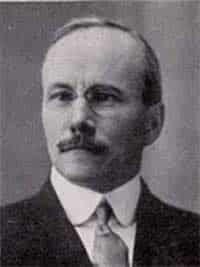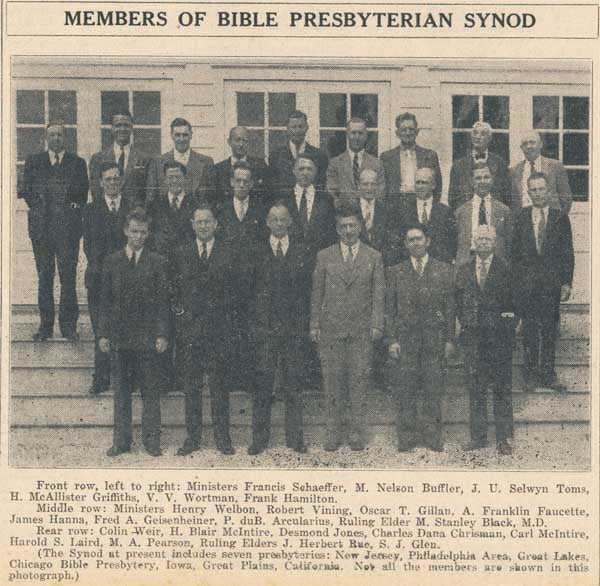How the West Was Won
From The Christian Observer, vol. 52, no. 40 (1 October 1873): 1, column 6.
Rev. S. J. P. Anderson, D.D.
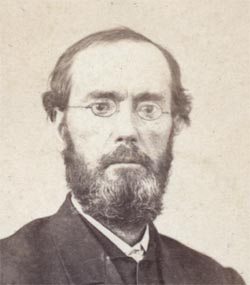 The life of Dr. Anderson, up to the time of his failing health, and retirement from the ministry, had been one of remarkable success. He was born in Prince Edward county, Virginia, on December 5th, 1814, the son of Sterling C. Anderson, of Appomattox, VA. The early years of his life were spent in the country, on the farm of his father, where, at a village school, and with the aid of a tutor at home, he was prepared for college. In 1831, he went to the University of Ohio, at Athens, and afterwards to Hanover College, Indiana, where he graduated in 1835. His theological course was pursued at Union Theological Seminary.
The life of Dr. Anderson, up to the time of his failing health, and retirement from the ministry, had been one of remarkable success. He was born in Prince Edward county, Virginia, on December 5th, 1814, the son of Sterling C. Anderson, of Appomattox, VA. The early years of his life were spent in the country, on the farm of his father, where, at a village school, and with the aid of a tutor at home, he was prepared for college. In 1831, he went to the University of Ohio, at Athens, and afterwards to Hanover College, Indiana, where he graduated in 1835. His theological course was pursued at Union Theological Seminary.
[Above right: One of several images of the Rev. S.J.P. Anderson preserved at the PCA Historical Center. The actor Henry Fonda bore a striking resemblance, don’t you agree?]
The first charge of Dr. Anderson was at Danville, Virginia, where he remained five years, the pastor of a large and constantly increasing congregation. From Danville, he removed to Norfolk, VA, where he soon took rank as one of the ablest and most effective preachers in that State—so famous for its preachers.
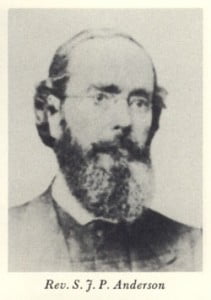 After remaining five years at Norfolk, he was called to St. Louis, and in 1851 was engaged as the pastor of the Central Presbyterian church in that city. At the time that Dr. Anderson took charge of the church it was far from being in a prosperous condition. It was yet in its infancy, few in numbers, embarrassed with debt, and greatly afflicted by the death of its first pastor, Rev. Alexander Van Court, of precious memory! The task before him was a difficult one; but, by faithful preaching and earnest work, with the blessing of God, he was enabled to accomplish it with success. Under his ministry the church grew steadily, was increased by considerable accessions from time to time, until it became, at length, one of the largest and most influential churches in the city.
After remaining five years at Norfolk, he was called to St. Louis, and in 1851 was engaged as the pastor of the Central Presbyterian church in that city. At the time that Dr. Anderson took charge of the church it was far from being in a prosperous condition. It was yet in its infancy, few in numbers, embarrassed with debt, and greatly afflicted by the death of its first pastor, Rev. Alexander Van Court, of precious memory! The task before him was a difficult one; but, by faithful preaching and earnest work, with the blessing of God, he was enabled to accomplish it with success. Under his ministry the church grew steadily, was increased by considerable accessions from time to time, until it became, at length, one of the largest and most influential churches in the city.
It is not too much to say of Dr. Anderson, that he was, in his day, a man of eminent usefulness and power in the ministry. He was a preacher of marked ability—earnest, evangelical and eloquent. He was a man of fine scholarship, large reading, and almost faultless taste; his mind was richly stored, not only with biblical, but also with historical learning, and the whole was laid under contribution to the pulpit. His sermons were not only sound and able, as expositions of gospel truth, but they were usually finished productions as they came from his hand, abounding in happy illustration, delivered in a pleasing, captivating style, and with a voice the richness and sweetness of whose tones lent a charm to every word that he uttered. It was indeed a strange providence as we look at it, which, before he had passed the meridian of his life, when he was yet in the vigor of his manhood, and in the full tide of his popularity and success, prostrated his health, deprived him of his voice, and consigned him to retirement and silence. But there can be no doubt that it was meant in wisdom and love. It was of the nature of the disease that Dr. Anderson suffered and of which he died, greatly to depress his spirits, and the latter years of his life were in consequence passed under a cloud of despondency and melancholy which never wholly cleared away, until the Master sent him the glad message of dismissal, and called him to “Come up higher.”
Amid all the clouds and darkness, however, that gathered about him, his hope of salvation was never for a moment obscured. He was wont to speak often of this as one of the sweet tokens of the favor of God. Everything else in his condition seemed to him to be dark and hopeless, but this blessed assurance of a personal interest in Christ never forsook him. Never did the sky grow so dark above him, but this bright star still trembled on the horizon of his hopes. His faith in Christ was firm as a rock to the last, and simple as that of a little child; his trust was solely on that precious blood that cleanseth from all sin, and he felt that he had nothing to fear. Death, the last enemy, whom we all so dread to meet, was disarmed of its terrors to him.–Old School Presbyterian. The Rev. S.J.P. Anderson breathed his last on September 10, 1873.
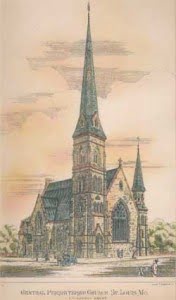 [The Central Presbyterian Church began as the Fourth Presbyterian Church in 1844 and acquired its present name in 1846 when it met in a small building at 6th and St. Charles Streets. Early clergy included Rev. Joseph Templeton and Rev. Alexander Vancourt, Rev. S. J. P. Anderson, and Rev. Robert G. Brank. In 1849 it moved to its own building at 8th and Locust where it remained until 1873. At that time it moved to a temporary chapel at the NE corner of Lucas and Garrison. Forced to retire a few years earlier, 1873 was also the year of Rev. S.J.P. Anderson’s death. A new church was built at the Lucas and Garrison location in 1876. This building was used until 1906 when the congregation moved to Delmar and Clara. The church is currently located at the corner of Hanley Road and Davis Drive in Clayton, Missouri. The architect’s drawing at left shows the church’s last building as envisioned by the architect, though the tall spire was never installed.]
[The Central Presbyterian Church began as the Fourth Presbyterian Church in 1844 and acquired its present name in 1846 when it met in a small building at 6th and St. Charles Streets. Early clergy included Rev. Joseph Templeton and Rev. Alexander Vancourt, Rev. S. J. P. Anderson, and Rev. Robert G. Brank. In 1849 it moved to its own building at 8th and Locust where it remained until 1873. At that time it moved to a temporary chapel at the NE corner of Lucas and Garrison. Forced to retire a few years earlier, 1873 was also the year of Rev. S.J.P. Anderson’s death. A new church was built at the Lucas and Garrison location in 1876. This building was used until 1906 when the congregation moved to Delmar and Clara. The church is currently located at the corner of Hanley Road and Davis Drive in Clayton, Missouri. The architect’s drawing at left shows the church’s last building as envisioned by the architect, though the tall spire was never installed.]
Words to Live By:
Man knows not his time. The Lord may call tomorrow, or our time may come many years from now; but surely we will all die. Keep your accounts current and be diligent, day by day, in what the Lord gives you to do. “So teach us to number our days, that we may present to You a heart of wisdom.” (Psalm 90:12, NASB)
Published works of the Rev. S.J.P. Anderson—
1845
The influence of the Bible on liberty: an address, delivered before the Union Society of Hampden Sidney College, September 18, 1845. Richmond, H.K. Ellyson, 1845. 32pp.
1850
“Form and Spirit,” in The Southern Presbyterian Review, 4.2 (October 1850) 177-197.
1851
“Notes on the Miracles of our Lord,” in The Southern Presbyterian Review, 4.4 (April 1851) 580-589.
“The Variety of Shakespeare, in The Southern Presbyterian Review, 4.3 (January 1851) 343-357.
1852
“The Unity of the Human Race, in The Southern Presbyterian Review, 5.4 (April 1852) 572-601.
1854
“Commemorative Discourse,” in A memorial of the Rev. Stephen Griffith Gassaway, A. M. : late Rector of St. George’s Church, Saint Louis. St. Louis: Printed at the “Missouri Democrat” Office, 1854.
1856
“The Prophets of the Restoration,” in The Southern Presbyterian Review, 9.4 (April 1856) 513-519.
1858
The Power of a Christian Literature : a sermon on behalf of the Assembly’s Board of Publication. Philadelphia : Presbyterian Board of Publication, 1858. 34pp.
1859
“The Fulness of Time, in The Southern Presbyterian Review, 11.4 (January 1859) 556-570.
1861
The Dangers and Duties of the Present Crisis! : A Discourse, delivered in the Union Church, St. Louis, January 4, 1861. St. Louis, Mo.: Schenck, 1861. 18pp. To view this title, available on the Web, click here.

